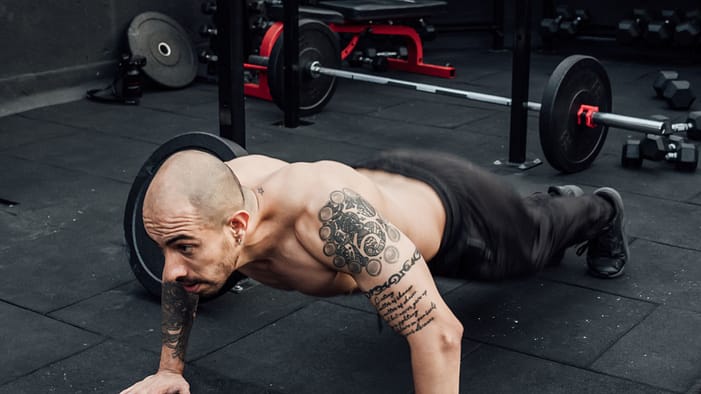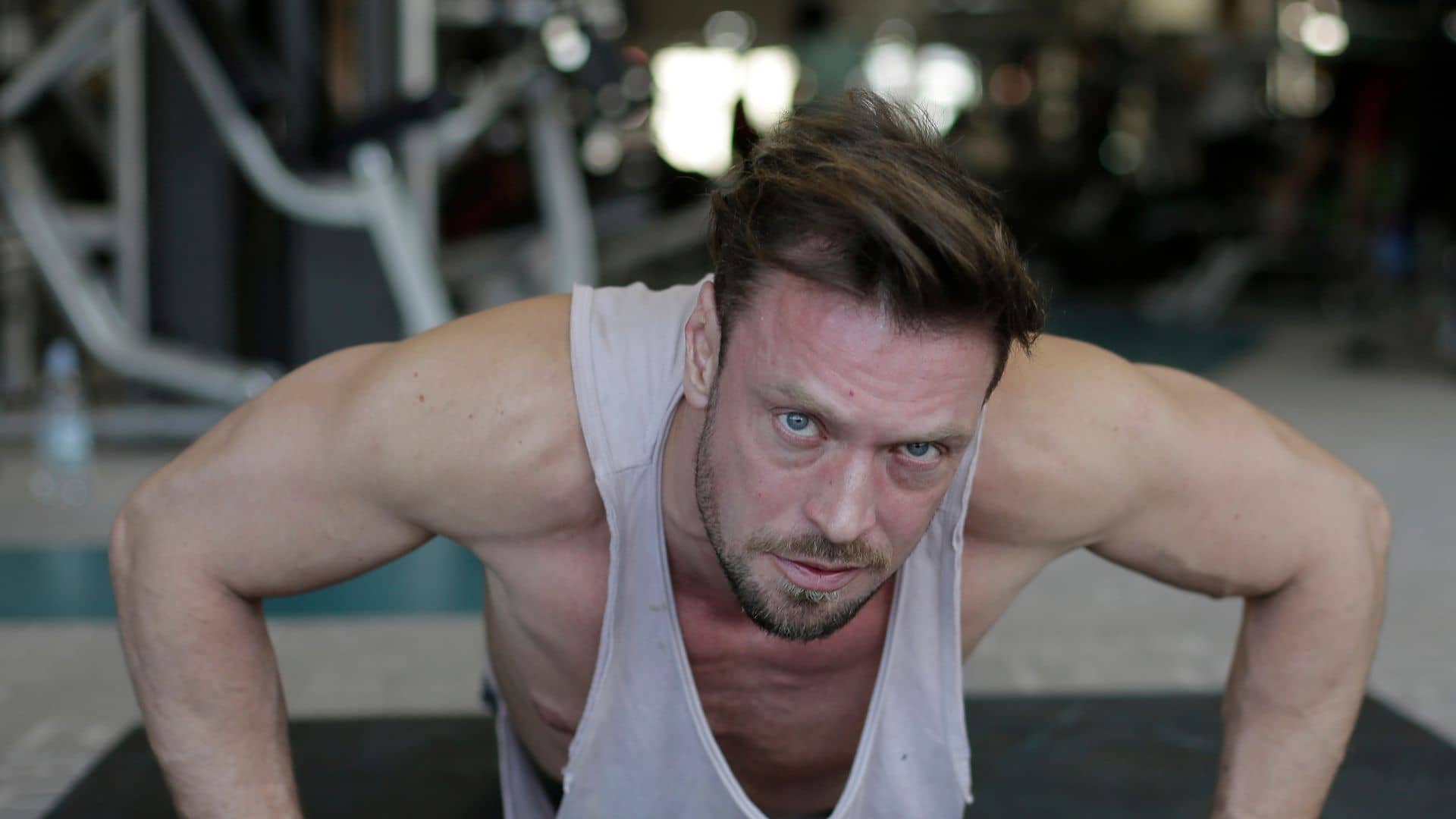If you’ve ever experienced a hurt head or headache during or after doing push-ups, you may be wondering why this happens.
While push-ups are an excellent exercise for building upper body strength, they can also cause discomfort and pain, particularly in the head.
In this post, I explore the possible reasons why push-ups make your head hurt and offer some tips on how to prevent headaches during this popular exercise.
Push-ups can make your head hurt or cause headaches for a variety of reasons. Here are four possible reasons why push-ups may be causing it: holding your breath, dehydration, blood flow increase, and underlying problem.
You’re holding your breath during exercise.
When you hold your breath during exercise, you’re creating a situation where your body has to work harder to get oxygen to your muscles, which can put extra stress on your cardiovascular system.
This can cause blood vessels in your head to dilate or constrict, leading to a headache.
During push-ups, it’s common for people to hold their breath when they’re lowering their body down to the floor and then exhale when they push back up.
This can cause a buildup of pressure in the chest, neck, and head, leading to hurt/ headache.
To prevent this, it’s Very important to focus on your breathing during exercise.
Breathe in deeply through your nose as you lower your body down to the floor, and then exhale through your mouth as you push back up.
This will help ensure that your body is getting enough oxygen, which can help prevent headaches during and after your workout.
Dehydration.
Dehydration can be a common cause of hurt/headaches during and after exercise, including push-ups.
When you exercise, you lose water and electrolytes through sweat, which can lead to dehydration if you’re not replenishing those fluids.
When you’re dehydrated, your body has to work harder to maintain blood flow and other bodily functions, which can cause headaches.

In addition, dehydration can cause your blood volume to decrease, which can lead to a decrease in oxygen delivery to the brain, further contributing to headaches.
To prevent dehydration and the resulting headaches, it’s important to drink plenty of water before, during, and after your workout.
A good rule of thumb is to drink at least 8 ounces of water every 15-20 minutes during exercise to stay hydrated.
If you’re exercising for longer than an hour or in hot, humid conditions, you may need to drink even more fluids to stay properly hydrated.
You may want to consider drinking an electrolyte-rich sports drink to replenish lost electrolytes and help prevent dehydration and headaches.
Blood flow increase.
When you exercise, including during push-ups, your heart rate increases and your blood vessels dilate to allow for increased blood flow to your muscles.
This increased blood flow can also cause blood vessels in your head to dilate, leading to a headache type of pain.
In addition, when you exercise, your body releases certain chemicals, such as endorphins, that can cause blood vessels in your head to expand and contract, leading to headaches.
To prevent headaches caused by increased blood flow during exercise, it’s important to warm up properly before your workout and gradually increase the intensity of your exercise.
This can help your body adjust to the increased blood flow and reduce the likelihood of headaches.
Staying hydrated during exercise can help maintain proper blood flow and prevent headaches.
Here is a chart table with 20 possible reasons why push-ups may cause your head to hurt or headaches, along with a brief explanation of each reason and a “brew” analogy for better understanding:
| Reason | Explanation | Brew Analogy |
|---|---|---|
| Dehydration | Lack of fluids in the body can cause headaches during exercise | Brewing coffee without enough water |
| Poor Form | Improper push-up form can lead to tension in the neck and head muscles | Pouring water into a French press from too high |
| High Blood Pressure | The exertion of push-ups can raise blood pressure and cause headaches | Brewing coffee with too much pressure |
| Tight Neck Muscles | Tension in the neck muscles can cause referred pain in the head | Brewing coffee with beans that are too tightly packed |
| Eye Strain | Focusing on a fixed point during push-ups can cause eye strain and headaches | Straining to read the instructions on a coffee bag |
| Sinus Infection | Inflammation of the sinuses can cause headaches during exercise | Brewing coffee when you have a cold |
| Caffeine Withdrawal | Lack of caffeine can cause headaches during exercise for those who are caffeine-dependent | Brewing decaf when you’re used to regular coffee |
| Exertion Headache | Intense exercise can trigger headaches in some people | Brewing coffee with too much force |
| Lack of Sleep | Insufficient sleep can lead to headaches during exercise | Brewing coffee when you’re tired and not paying attention |
| Neck Injury | Previous neck injuries can cause headaches during push-ups | Brewing coffee with a cracked carafe |
| Migraine | Those prone to migraines may experience headaches during exercise | Brewing coffee when you have a migraine |
| TMJ Disorder | Jaw clenching during push-ups can trigger headaches in those with TMJ disorder | Grinding coffee beans with a faulty grinder |
| Heat Exhaustion | Exercise in hot weather can cause headaches due to dehydration and heat exhaustion | Brewing coffee in a hot environment without proper ventilation |
| Low Blood Sugar | Exercise on an empty stomach can cause headaches due to low blood sugar | Brewing coffee without adding enough sweetener or cream |
| Allergies | Allergies can cause headaches during exercise | Brewing coffee with beans that you’re allergic to |
| Tension Headache | Tension headaches can be triggered by physical exertion, such as push-ups | Brewing coffee when you’re feeling stressed or tense |
| Medication Side Effects | Certain medications can cause headaches during exercise | Brewing coffee with expired or contaminated beans |
| Posture | Poor posture during push-ups can cause tension headaches | Brewing coffee while slouching or hunching over |
| Anxiety | Anxiety can cause tension headaches during exercise | Brewing coffee when you’re feeling anxious or nervous |
Brew Analogy:
The brew analogy compares the potential reasons for headaches during push-ups to common mistakes or issues that can occur while brewing coffee.
This analogy helps to simplify and conceptualize the various reasons for headaches during push-ups.
Underlying problem.
Experiencing a hurt head or headache during or after exercise could be a sign of an underlying problem, such as bleeding in the area between the brain and the thin membranes that cover the brain.
However, primary exercise hurt head/headaches typically last between five minutes and 48 hours, while secondary exercise headaches usually last at least a day and sometimes linger for several days or longer.
Although the headaches usually have no underlying cause, it is important to talk to a healthcare provider to make sure.
Treatment for exertion headaches is similar to other headaches, and certain strategies may help prevent them.
If you’re getting headaches during push-ups, it’s important to identify the underlying cause so you can take steps to prevent them.
By making adjustments to your form, staying hydrated, and practicing good self-care habits, you can reduce your risk of experiencing headaches during this challenging exercise.
Don’t let headaches stop you from achieving your fitness goals – with a bit of knowledge and effort, you can enjoy the benefits of push-ups without the pain.


